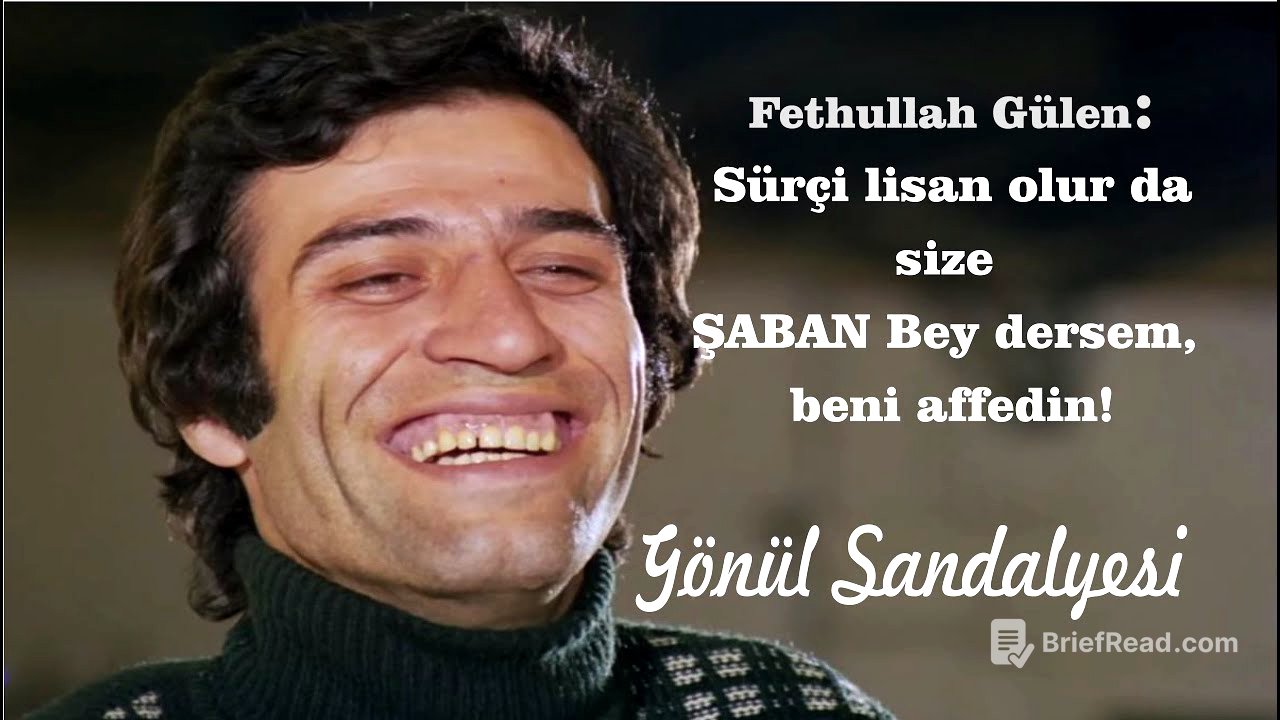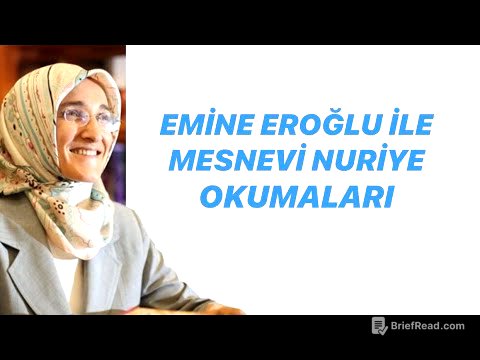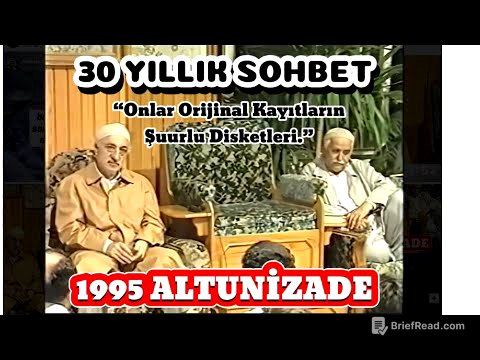TLDR;
Gürkan Vural introduces his YouTube channel, "Chair of the Heart," aiming to share his experiences and testimonies from his time with the Journalists and Writers Foundation. He discusses the importance of dialogue, addressing poverty, and education as key solutions to societal problems, drawing from the teachings of Master Bediuzzaman. Vural recounts his early efforts to engage with artists, including a memorable encounter with Kemal Sunal, and emphasizes the value of building relationships and understanding across different segments of society.
- Introduction of YouTube channel "Chair of the Heart"
- Importance of dialogue, addressing poverty, and education
- Early efforts to engage with artists and Kemal Sunal encounter
Introduction and Background [0:02]
Gürkan Vural starts by greeting his audience from various parts of the world and introduces himself to those who are new to his YouTube channel. He shares that he was born in 1967 in the Çaycuma district of Zonguldak, and after high school, he lived in Ankara, abroad, and then again in Türkiye. He considers his life a means of service and intends to share his experiences and testimonies from his time with the Journalists and Writers Foundation, especially concerning the attacks focused on the community.
The Chair of the Heart and Its Philosophy [3:50]
Vural explains the name of his program, "Chair of the Heart," inspired by his elder, encouraging everyone to have a place in their heart for others. He emphasizes that the Journalists and Writers Foundation aimed to align its activities with the core principles of service. He mentions that they sought advice and ideas from their elder, whose excitement motivated them in their activities.
Addressing Societal Problems: Dialogue, Poverty, and Education [6:33]
Vural discusses Master Bediuzzaman's identification of slander, poverty, and ignorance as the main problems facing humanity. He highlights the importance of dialogue to overcome divisions, citing the Abantı meetings as a successful example of bringing together opposing societal groups. He also emphasizes the need to address poverty through community outreach and charity organizations, as well as the importance of education to combat ignorance, focusing on the role of schools and study centers.
The Journalists and Writers Foundation: Establishing Dialogue [14:08]
Vural explains that one of the main reasons for establishing the Journalists and Writers Foundation was to foster dialogue and reach out to different segments of society. The foundation officially announced its existence at a meeting on June 29, 1994, and in 1995, the idea of giving awards to prominent members of society who embraced tolerance and dialogue was born. The first tolerance awards were given on January 5, 1996, and a photograph of Professor Doctor Toktdamış Ateş Hoca and Fethullah Gülhan Hoca Efendi holding hands became a prominent symbol of the event.
Early Career and Joining the Journalists and Writers Foundation [21:19]
Vural recounts his early career, including his work at Samanyolu television, and how he received a call from the Journalists and Writers Foundation, leading him to join the organization. He started as an assistant to Professor Mim Kemal Öken, and later became involved in the culture and arts department. He describes the intellectual atmosphere and conversations that took place at the foundation.
The Challenge of Reaching Out to Artists [25:11]
Vural discusses the initial difficulties he faced in reaching out to artists, emphasizing the importance of having a personal connection to the task. He shares humorous anecdotes about calling artists' phone numbers and encountering unrelated individuals or receiving insults. He also recounts an incident where he insisted on meeting an artist who had passed away two years prior, highlighting his initial lack of familiarity with the art world.
Persistence and the Encounter with Kemal Sunal [29:47]
Vural emphasizes the importance of perseverance and shares the story of how he finally managed to contact Kemal Sunal with the help of Periyan Savaş. He recounts the humorous conversation he had with Sunal over the phone, leading to an agreement to meet at a hotel. Vural describes the excitement and preparations leading up to the meeting, including buying a special pen as a gift.
The First Meeting with Kemal Sunal [35:42]
Vural describes his first meeting with Kemal Sunal at the Hayat Regency Hotel, noting Sunal's warm and humorous demeanor. He recounts how Sunal insisted on opening the gift himself and then surprised him by revealing his extensive knowledge of the community and its history. Sunal then requested a one-on-one meeting with Vural's teacher.
Arranging the Meeting and Kemal Sunal's Request [40:17]
Vural recounts arranging the meeting between Kemal Sunal and his teacher, describing the surprise and happiness of his colleagues. He shares the details of how the meeting was set up and the anticipation surrounding it. After the meeting, Kemal Sunal requested a set of his teacher's books.
The Meeting and Its Aftermath [42:38]
Vural describes the meeting between Kemal Sunal and his teacher, noting the warm reception and the discussions that took place. He recounts how Sunal expressed his concerns about copyright issues and later requested a set of his teacher's books. Vural then delivered the books to Sunal's house.
Kemal Sunal's Appreciation and Understanding [49:10]
Vural recounts a subsequent meeting with Kemal Sunal, where Sunal revealed that he had read all the books and taken detailed notes. Sunal asked Vural to share their conversation with his teacher, demonstrating his genuine interest and understanding. Vural emphasizes the value of building relationships and understanding across different segments of society.
The Importance of Personal Connection and Defending Against Slander [51:38]
Vural shares anecdotes about Cem Karaca and his positive experiences with the community, emphasizing the importance of personal connection and shaking hands as a way to conquer hearts. He recounts an incident where Cem Karaca defended the community against slander, highlighting the significance of knowing and understanding people before making judgments.
Conclusion and Invitation to Future Conversations [1:00:08]
Vural concludes the program, expressing his gratitude to the audience and inviting them to provide feedback and guidance for future conversations. He encourages viewers to subscribe to his channel and promises to continue sharing his experiences and testimonies in the coming weeks.









